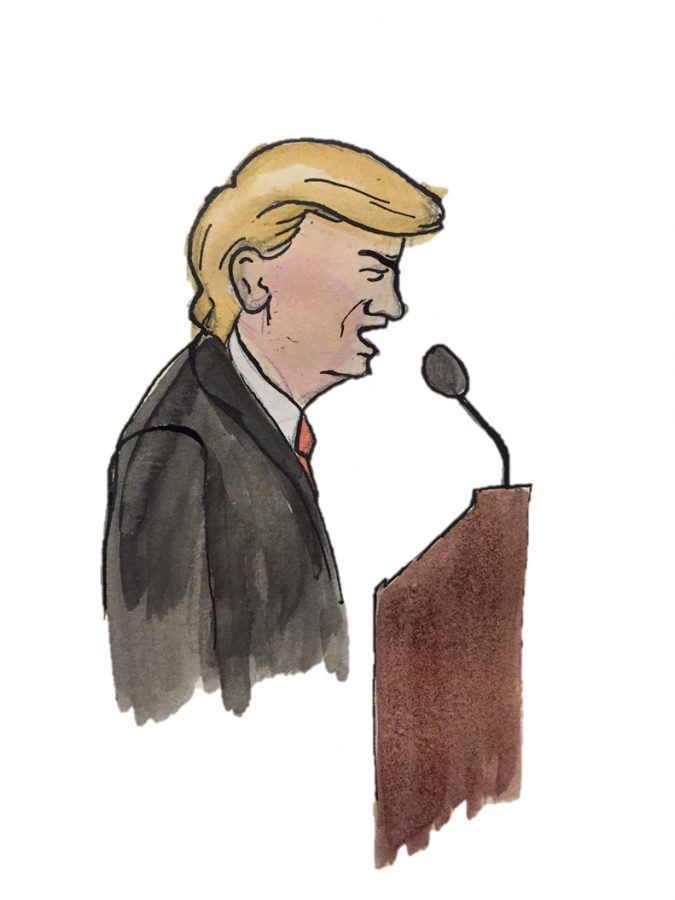Like the price of coffee or the daily weather report, a free and fair press is such a consistent part of American society that most people don’t even think about its presence. At least not until it’s threatened to be taken away.
It’s becoming very clear that our current president holds the press in dismally low regard and doesn’t enjoy its prying eyes, a view very much in line with the actions of historical authoritarians, past and present. Both journalists and readers have a duty to protect the press from this looming threat.
President Trump has stated that he has “a running war with the media” and that the media are “among the most dishonest human beings on Earth.” And he’s treated the press in accordance with these stances, ditching the White House press pool on multiple separate occasions during his transition.
The Trump administration’s treatment of the press has only worsened since he’s officially taken office. For White House Press Secretary Sean Spicer’s first press conference, the President sent him to lie to the media about the underwhelming size of his inaugural crowd. And afterward, senior counselor Kellyanne Conway doubled down on Spicer’s false claims, infamously dubbing them “alternative facts.” And yet, the most worrisome comments came from Chief White House Strategist Steve Bannon, who called the media “the opposition party” and said they should “keep [their mouths] shut.”
Such disdain for the media is not a theme specific to American politicians either. Marine Le Pen, candidate for the French presidency and far-right Front National Party leader, was asked by a journalist at a press conference last Thursday about allegations that she used government funds to pay party staff members. Instead of getting an answer, the journalist, Paul Larrouturou, was violently ejected from the event by security forces. Larrouturou and the Front National Party disagree about who ordered and enforced his removal, but the fact that anyone could remove a journalist from a press conference without consequence is a chilling enough sentiment.
Trump and his administration seem to be mimicking previous authoritarian regimes throughout history. His continuous degradation of the Washington Post and the “failing” New York Times is reminiscent of Mussolini’s disdain for critical newspapers in the time of Fascist Italy. This isn’t to suggest that Trump is on track to take editorial control over American newspapers like Mussolini, but degrading the credibility of the media would certainly be the first step in such a process.
Similarly, while some may inappropriately reference Adolf Hitler when talking about Trump, some of his actions do bear resemblance to aspects of 1930s Germany. One term, “lügenpresse” — or “lying press” — was quite popular among Nazi supporters during the Third Reich to discredit those who opposed Hitler’s regime, alarmingly similar to Trump’s labeling of CNN as “fake news.”
Trump’s tendencies not only model historical figures of the past but seem to echo more controversial leaders of the present as well. Vladimir Putin also has a similar distaste for press conferences and often, like Trump and his team, resorts to misdirection, omission of important details and falsehoods in them. Russian journalist Alexey Kovalev wrote in a letter published by Medium that Putin “always comes with a bag of meaningless factoids… platitudes, false moral equivalences and straight, undiluted bulls**t” in order to sidestep questioning. This technique, when used by Trump or Spicer, works particularly well against modern American journalists because they aren’t accustomed to the White House as an unreliable source of information.
Trump’s similarities to Putin’s treatment of the media are troubling, as the Russian president has dealt harshly with journalists critical of his regime. Independent journalists in Omsk who published articles critical of the Putin regime found their accreditation suspended by the government. And we can consider those guys lucky when we take note of the 34 journalists who were coincidently killed during Putin’s first reign from 2000-2008.
President Trump’s aggressive campaign against the mainstream media, paired with his uncomfortable fondness for tactics of both authoritarian regimes of the past and the modern-day Vladimir Putin, should leave Americans feeling more than just uneasy. And we cannot stand idly by while the Trump administration spews misinformation at us without being held accountable.
When it comes to freedom of the press, the media must become the “opposition party” Steve Bannon thinks they are and do everything in their power to protect the free press for the next four years. They must continue to call out fake news, political overreach and corruption as they see it. And we as readers also have an obligation to do the same and support legitimate news organizations and fact checkers by subscribing and contributing — or at the very least turning off AdBlock.
If Trump and his administration want to take on the media, we can’t stop them. But we can fight back. If they want war, they’ve got war.
Nick primarily writes on politics and American culture for The Pitt News.
Write to Nick at [email protected].


